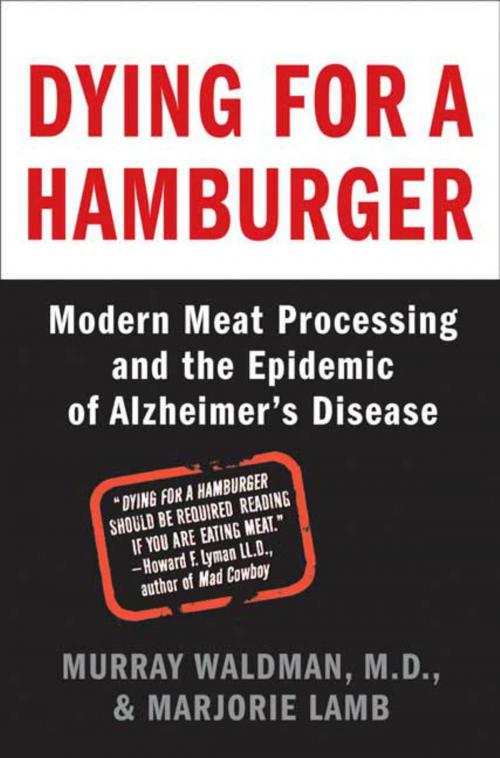Dying for a Hamburger
Modern Meat Processing and the Epidemic of Alzheimer's Disease
Nonfiction, Science & Nature, Technology, Food Industry & Science, Health & Well Being, Medical, Ailments & Diseases, Diseases| Author: | Marjorie Lamb, Dr. Murray Waldman | ISBN: | 9781466872158 |
| Publisher: | St. Martin's Press | Publication: | May 27, 2014 |
| Imprint: | Thomas Dunne Books | Language: | English |
| Author: | Marjorie Lamb, Dr. Murray Waldman |
| ISBN: | 9781466872158 |
| Publisher: | St. Martin's Press |
| Publication: | May 27, 2014 |
| Imprint: | Thomas Dunne Books |
| Language: | English |
One in ten people older than sixty-five, and nearly half of those older than eighty-five, have Alzheimer's disease.
It's widely accepted nowadays that memory loss comes with age. Alzheimer's currently robs at least 15 million people of their identity worldwide. This book makes the controversial claim that eating meat may contribute to the development of the disease.
In Dying for a Hamburger, Dr. Murray Waldman and Marjorie Lamb draw upon documentary evidence, historical testimony, and inspired speculation to suggest that Alzheimer's:
- is a new disease--elderly people did not experience symptoms of dementia in such alarming numbers in the past
- began appearing after modern meat production techniques were introduced
- has soared in nations where these techniques are used
- hardly exists in cultures where meat consumption is low
- has been attributed to many deaths that are actually the human equivalent of mad cow disease.
They present startling evidence that Alzheimer's may be part of a family of diseases linked to malformed proteins known as prions. They hypothesize that the conditions that allow these brain disorders to be triggered are similar. They propose that mad cow, its human equivalent, Creutzfeldt-Jakob disease (CJD), other encephalitic diseases, and Alzheimer's may have a common antecedent.
We know that a form of CJD is transmitted to humans who eat contaminated beef. And we are becoming increasingly aware of the need to monitor the meat supply closely to avoid a repetition of the mad cow scare in Great Britain. But suppose that Alzheimer's also involves prions--the evidence that points in this direction is growing. And suppose that Alzheimer's is also associated with tainted meat.
This conclusion seems far-fetched--at first. In this compelling book, the authors come to a frightening conclusion about our seemingly insatiable hunger for hamburgers. Destined to provoke heated argument, this book on the prevention of Alzheimer's is definitely food for thought.
One in ten people older than sixty-five, and nearly half of those older than eighty-five, have Alzheimer's disease.
It's widely accepted nowadays that memory loss comes with age. Alzheimer's currently robs at least 15 million people of their identity worldwide. This book makes the controversial claim that eating meat may contribute to the development of the disease.
In Dying for a Hamburger, Dr. Murray Waldman and Marjorie Lamb draw upon documentary evidence, historical testimony, and inspired speculation to suggest that Alzheimer's:
- is a new disease--elderly people did not experience symptoms of dementia in such alarming numbers in the past
- began appearing after modern meat production techniques were introduced
- has soared in nations where these techniques are used
- hardly exists in cultures where meat consumption is low
- has been attributed to many deaths that are actually the human equivalent of mad cow disease.
They present startling evidence that Alzheimer's may be part of a family of diseases linked to malformed proteins known as prions. They hypothesize that the conditions that allow these brain disorders to be triggered are similar. They propose that mad cow, its human equivalent, Creutzfeldt-Jakob disease (CJD), other encephalitic diseases, and Alzheimer's may have a common antecedent.
We know that a form of CJD is transmitted to humans who eat contaminated beef. And we are becoming increasingly aware of the need to monitor the meat supply closely to avoid a repetition of the mad cow scare in Great Britain. But suppose that Alzheimer's also involves prions--the evidence that points in this direction is growing. And suppose that Alzheimer's is also associated with tainted meat.
This conclusion seems far-fetched--at first. In this compelling book, the authors come to a frightening conclusion about our seemingly insatiable hunger for hamburgers. Destined to provoke heated argument, this book on the prevention of Alzheimer's is definitely food for thought.















